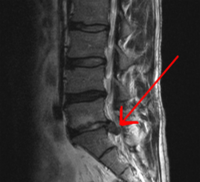
Photo from wikipedia
Abstract Background Gastroparesis and functional dyspepsia are disorders characterized by upper gastrointestinal symptoms and multifaceted etiologies. One of the main therapeutic approaches is accelerating gastric emptying (GE) by means of… Click to show full abstract
Abstract Background Gastroparesis and functional dyspepsia are disorders characterized by upper gastrointestinal symptoms and multifaceted etiologies. One of the main therapeutic approaches is accelerating gastric emptying (GE) by means of prokinetic agents. Their efficacy has been demonstrated, although the association between symptom improvement and acceleration of emptying is less clear. Meta‐analyses have found contradictory results. Differences in applied methodology and included trials might drive these contradictions. Objective To provide a transparent meta‐analysis update to elucidate the association between symptom improvement and acceleration of GE due to gastroprokinetic agents available for long‐term use in patients with gastroparesis. Design Two approaches from earlier meta‐analyses were executed and compared. One analyzed the relative changes on active treatment versus baseline, the other compared the change from baseline on active treatment versus the change from baseline on placebo. Papers that reported sufficient numerical data for both analyses were selected. Both analyses included the same trials. Results Overall, both approaches yield the same positive direction of association between symptom improvement and acceleration of emptying (0.291 (−0.391, 0.972), p = 0.4 and 0.453 (0.123, 0.782), p = 0.007 for the active‐only and placebo‐controlled analysis respectively). The association between symptom improvement and GE acceleration for studies using optimal GE tests was either 0.028 (p > 0.9) or 0.463 (p = 0.007), and for sub‐optimal GE tests was either 0.370 (p = 0.4) or 0.052 (p > 0.9) depending on the used meta‐analysis methodology. Conclusions The applied methodology for GE testing, and the meta‐analysis substantially impacts the conclusion. When considering the clinically relevant outcome of improvement from baseline, symptoms and emptying improve with prokinetics, but no correlation is found between both aspects. When the change over placebo is considered, limiting the analysis to scientifically more rigorous study approaches, changes in emptying rate and symptom improvement are positively associated.
Journal Title: United European Gastroenterology Journal
Year Published: 2023
Link to full text (if available)
Share on Social Media: Sign Up to like & get
recommendations!